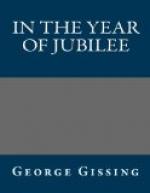And Mary, lifting her eyes, met his look of appeal with more than a friend’s confidence.
CHAPTER 2
From chambers in Staple Inn, Lionel Tarrant looked forth upon the laborious world with a dainty enjoyment of his own limitless leisure. The old gables fronting upon Holborn pleased his fancy; he liked to pass under the time-worn archway, and so, at a step, estrange himself from commercial tumult,—to be in the midst of modern life, yet breathe an atmosphere of ancient repose.
He belonged to an informal club of young men who called themselves, facetiously, the Hodiernals. Vixi hodie! The motto, suggested by some one or other after a fifth tumbler of whisky punch, might bear more than a single interpretation. Harvey Munden, the one member of this genial brotherhood who lived by the sweat of his brow, proposed as a more suitable title, Les Faineants; that, however, was judged pedantic, not to say offensive. For these sons of the Day would not confess to indolence; each deemed himself, after his own fashion, a pioneer in art, letters, civilisation. They had money of their own, or were supported by some one who could afford that privilege; most of them had, ostensibly, some profession in view; for the present, they contented themselves with living, and the weaker brethren read in their hodiernity an obligation to be ‘up to date.’
Tarrant professed himself critical of To-day, apprehensive of To-morrow; he cast a backward eye. None the less, his avowed principle was to savour the passing hour. When night grew mellow, and the god of whisky inspired his soul, he shone in a lyrical egoism which had but slight correspondence with the sincerities of his solitude. His view of woman—the Hodiernals talked much of woman—differed considerably from his thoughts of the individual women with whom he associated; protesting oriental sympathies, he nourished in truth the chivalry appropriate to his years and to his education, and imaged an ideal of female excellence whereof the prime features were moral and intellectual.
He had no money of his own. What could be saved for him from his father’s squandered estate—the will established him sole inheritor—went in the costs of a liberal education, his grandmother giving him assurance that he should not go forth into the world penniless. This promise Mrs. Tarrant had kept, though not exactly in the manner her grandson desired. Instead of making him a fixed allowance, the old lady supplied him with funds at uncertain intervals; with the unpleasant result that it was sometimes necessary for him to call to her mind his dependent condition. The cheques he received varied greatly in amount,—from handsome remittances of a hundred pounds or so, down to minim gifts which made the young man feel uncomfortable when he received them. Still, he was provided for, and it could not be long before this dependency came to an end.




